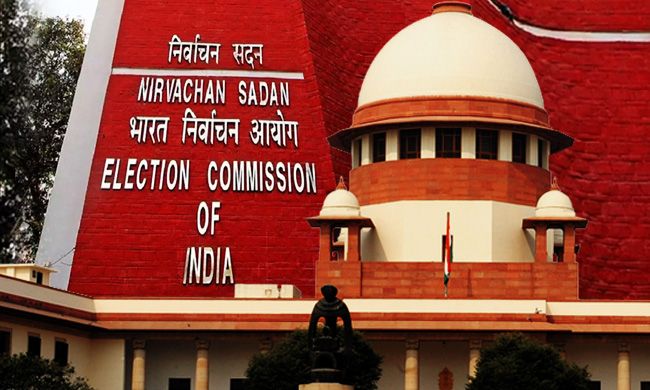Context
-
Recently, a petition was filed in the Supreme Court seeking the constitution of an Independent Collegium to appoint members of the Election Commission.
About the Petition on Independent Collegium
- The plea filed by Association for Democratic Reforms said the practise of government making the appointments to the poll body is a violation of the Basic Structure of the Constitution and creates a dent on free and fair elections in a democracy.
- The recommendation to have a neutral collegium to fill up vacancies in the Election Commission have been given by several expert committees, commissions from 1975.
- The practice of the central government appointing the members of the Election Commission violates Articles 14 and 324(2) of the Constitution, the non-government organization said in its plea.
- The recommendation was also part of the Law Commission in its 255th report in March 2015.
- Reference is also made to the 4th Report submitted by the Second Administrative Reform Commission in January 2007, which also recommended for the constitution of a neutral and independent collegium headed by the Prime Minister with the Speaker of the Lok Sabha, the Leader of Opposition in the Lok Sabha, the Law Minister and the Deputy Chairman of the Rajya Sabha as is members for making recommendations for consideration of the President for appointment of the Chief Election Commissioner and the Election Commissioners.

- The appointment of Chief Election Commissioner and Election Commissioners is done solely by the Executive… Election Commission should be insulated from political and/or Executive interference… the appointment of members of the Election Commission on the whims and fancies of the Executive violates the very foundation on which it was created, thus, making the Commission a branch of the Executive.
- It said the appointment to the poll body by the government is incompatible with Article 324(2) — appointments to be made by the President — and is “manifestly arbitrary”.
- The Election Commission is not only responsible for conducting free and fair elections, but it also renders a quasi judicial function between the various political parties including the ruling government and other parties.
- In such circumstances the Executive cannot be the sole participant in the appointment of members of the Election Commission as it gives unfettered discretion to the ruling party to choose someone whose loyalty to it is ensured and thereby renders the selection process vulnerable to manipulation.
Back to Basics
Election Commission of India (ECI)
- The ECI is a constitutional body responsible for administering elections in India according to the rules and regulations mentioned in the Constitution of India.
- It was established on January 25, 1950.
- The major aim of the election commission of India is to define and control the process for elections conducted at various levels, Parliament, State Legislatures, and the offices of the President and Vice President of India.
Functions
According to Article 324 of the Indian Constitution:
- The ECI has superintendence, direction, and control of the entire process for conduct of elections to Parliament and Legislature (state legislative assembly & state legislative council) of every State and to the offices of President and Vice-President of India.
Composition
- Initially, the commission had only a Chief Election Commissioner. Presently, it consists of a Chief Election Commissioner and two Election Commissioners.
- For the first time, two additional Commissioners were appointed on 16th October 1989 but they had a very short term till 1st January 1990.
- Afterwards, on 1st October 1993, two additional Election Commissioners were appointed.
- The concept of a multi-member Commission has been in operation since then, with decision-making power by majority vote.
Appointment & Tenure of Commissioners
- The President has the power to select Chief Election Commissioner and Election Commissioners.
- They have a tenure of six (06) years, or up to the age of 65 years, whichever is earlier.
- They have the same status and receive pay and perks as available to Judges of the Supreme Court of India.
- The CEC can be removed from office only through accusation by Parliament.
- The election commissioner or a regional commissioner shall not be removed from office except on the recommendation of the CEC.
Polity and Constitution Current Affairs : Click Here
